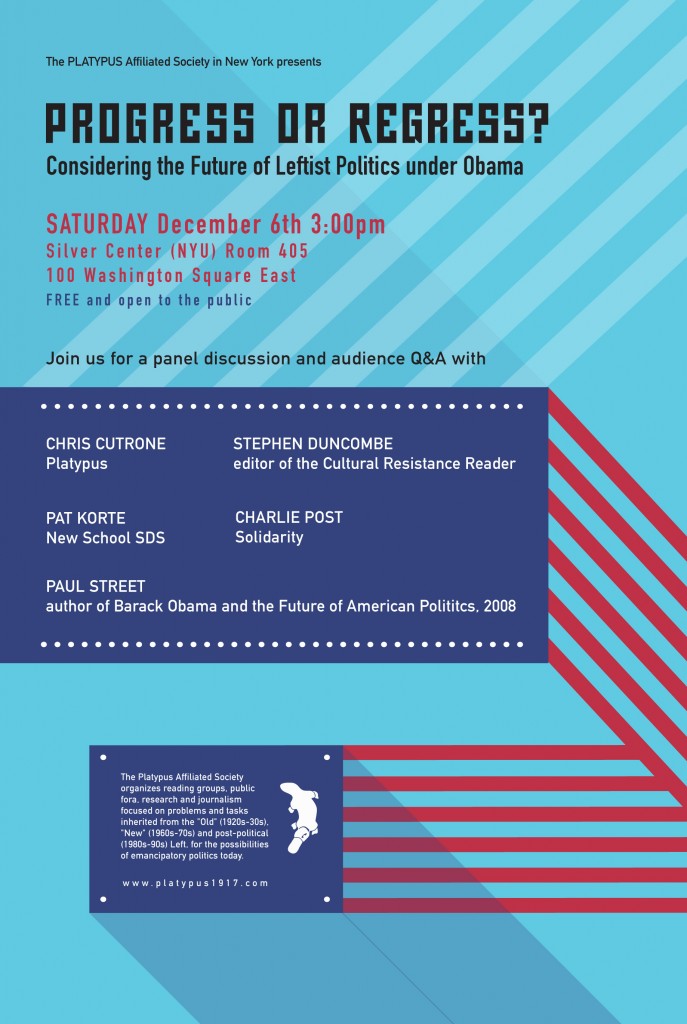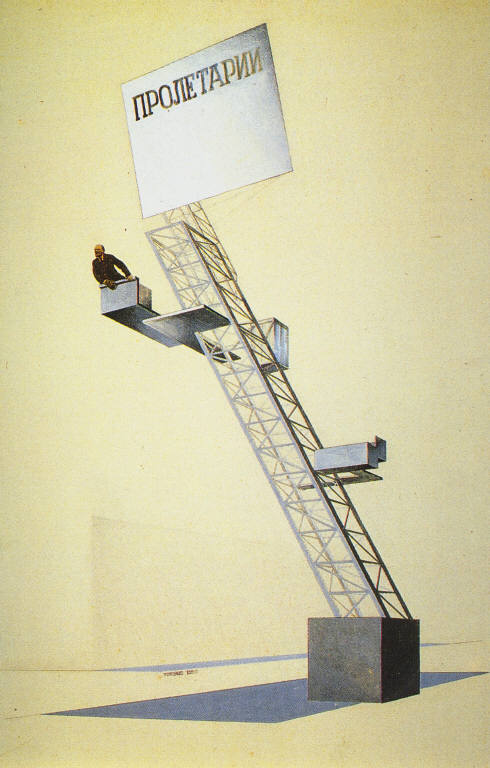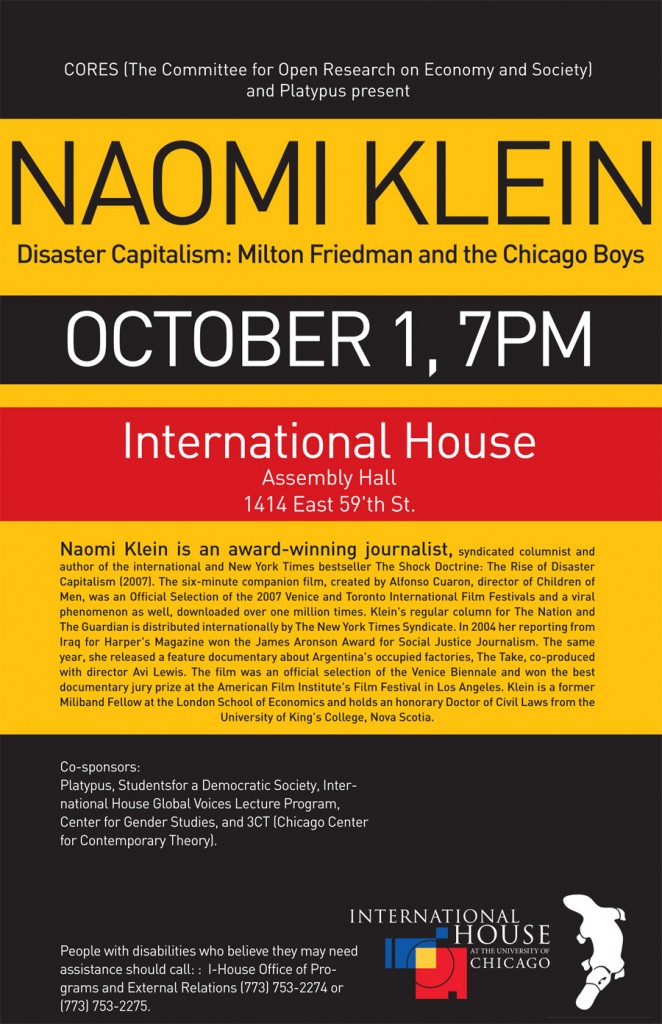Freedom in history?
Chris Cutrone
Presented on the panel “Reconsidering Benjamin,” with panelists Alfred Frankowski (University of Oregon) and Donald Hedrick (Kansas State University), at the Rethinking Marxism 2009 conference, University of Massachusetts, Amherst, November 7, 2009. A prior, expanded version was presented at the University of Chicago History of Culture Symposium, May 30, 2008. Draft: not to be cited in present form.
I’d like to begin with a few citations as epigraphs, on the concepts of “freedom” and “history.” The first is from James Miller’s Introduction to the 1992 Hackett edition of Rousseau’s Discourse on the Origin of Inequality:
The principle of freedom and its corollary, “perfectibility,” . . . suggest that the possibilities for being human are both multiple and, literally, endless. . . . Contemporaries like Kant well understood the novelty and radical implications of Rousseau’s new principle of freedom [and] appreciated his unusual stress on history as the site where the true nature of our species is simultaneously realized and perverted, revealed and distorted. A new way of thinking about the human condition had appeared. . . . As Hegel put it, “The principle of freedom dawned on the world in Rousseau, and gave infinite strength to man, who thus apprehended himself as infinite.”
Next, to address the concept of “history,” I’d like to quote from Peter Preuss’s Introduction to the 1980 Hackett edition of Nietzsche’s On the Advantage and Disadvantage of History for Life, which was highly influential for Benjamin:
The nineteenth century had discovered history and all subsequent inquiry and education bore the stamp of this discovery. This was not simply the discovery of a set of facts about the past but the discovery of the historicity of man: man, unlike the animal, is a historical being. Man is not wholly the product of an alien act, either natural or divine, but in part produces his own being. The task of existing is a task precisely because it is not a case of acting according to a permanent nature or essence but rather of producing that nature within the limitations of a situation. History is the record of this self-production; it is the activity of a historical being recovering the past into a present which anticipates the future. With a total absence of this activity man would fall short of humanity: history is necessary.
But what if this activity is perverted? What if, rather than remaining the life-promoting activity of a historical being, history is turned into the objective uncovering of mere facts by the disinterested scholar — facts to be left as they are found, to be contemplated without being assimilated into present being? . . . [T]his perversion has taken place — and history, rather than promoting life, has become deadly. This, then, is the dilemma: . . . history is necessary, but as it is practiced it is deadly.
The third and final epigraph I’d like to cite, also on “history,” is from Louis Menand’s Introduction to the 2003 republication of Edmund Wilson’s 1940 book To the Finland Station, which addressed the history of the Left from its emergence in the French Revolution all the way up to the eve of the Bolshevik Revolution in 1917:
In pre-modern societies, the ends of life are given at the beginning of life: people do things in their generation so that the same things will continue to be done in the next generation. Meaning is immanent in all the ordinary customs and practices of existence, since these are inherited from the past, and are therefore worth reproducing. The idea is to make the world go not forward, only around. In modern societies, the ends of life are not given at the beginning of life; they are thought to be created or discovered. The reproduction of the customs and practices of the group is no longer the chief purpose of existence; the idea is not to repeat, but to change, to move the world forward. Meaning is no longer immanent in the practices of ordinary life, since those practices are understood by everyone to be contingent and time-bound. This is why death, in modern societies, is the great taboo, an absurdity, the worst thing one can imagine. For at the close of life people cannot look back and know that they have accomplished the task set for them at birth. This knowledge always lies up ahead, somewhere over history’s horizon. Modern societies don’t know what will count as valuable in the conduct of life in the long run, because they have no way of knowing what conduct the long run will find itself in a position to respect. The only certain knowledge death comes with is the knowledge that the values of one’s own time, the values one has tried to live by, are expunge-able. . . .
Marxism gave a meaning to modernity. It said that, wittingly or not, the individual performs a role in a drama that has a shape and a goal, a trajectory, and that modernity will turn out to be just one act in that drama. Historical change is not arbitrary. It is generated by class conflict; it is faithful to an inner logic; it points toward an end, which is the establishment of the classless society. Marxism was founded on an appeal for social justice, but there were many forms that such an appeal might have taken. Its deeper attraction was the discovery of meaning, a meaning in which human beings might participate, in history itself. When Wilson explained, in his introduction to the 1972 edition of To the Finland Station, that his book had been written under the assumption that “an important step in progress has been made, that a fundamental ‘breakthrough’ had occurred,” this is the faith he was referring to. . . . Marx and Engels were the philosophes of a second Enlightenment.
The relevance of history is not given but made, in a dialectical sense. As Marx put it, humanity makes history but not under conditions of its own choosing (The 18th Brumaire of Louis Bonaparte, 1852). History is made but in ways that also produce us, and so we need to be conscious of how history is made and reflect upon its significance, rather than taking it for granted. Furthermore, “history” itself is a modern discovery: history is historical. This is not least why Walter Benjamin spoke, in his 1940 “Theses on the Philosophy of History,” of the “writing” of history, historiography on the Left being urgent for emancipatory politics, for the possibilities for social emancipation are not only historical but point to potentials beyond the historical, to the possibility of getting beyond history, for which capital might be the beginning and the end.
Benjamin’s concept of “constellation” refers to the sense that historical moments might not have pertinence to the present in a linear-progressive way. Rather, these historical constellations appear as structuring figures in the constitution of the present, as enduring problems yet to be worked through. Hence something that happened more recently might not have more immediate relevance to problems of the present than something that happened longer ago. Something later might expire faster because it is less essential to the present than something earlier might allow us to grasp.
Such constellations in the appearance of history are involuntary: as Benjamin put it, they “flash up;” as Marx put it, they “weigh like a nightmare on the brains of the living.” So history cannot be an inventory of “lessons already learned.” According to Nietzsche, responding to the Hegelian account of history as the story of reason and freedom, there is in history a dialectic of enlightenment and mythologization. For, as Benjamin put it, “even the dead are not safe.” The significance of the past changes as a function of the present. The meaning of history is itself a symptom to be worked through. This is why Benjamin spoke of regarding history from the standpoint of its redemption. What value do past thoughts and actions have? The history of the Left furnishes a set of questions and problems that we are tasked to answer according to the way the problem of freedom presents to us. But, as Adorno put it (in Negative Dialectics, 1966), “What has been cast aside but not absorbed theoretically will often yield its truth content only later. It festers as a sore on the prevailing health; this will lead back to it in changed situations.”
For Benjamin, this non-linear function of the past in the present constitutes the critical purchase of the melancholic-neurotic compulsion to repeat, the capture of the present by the past, but as a symptom yet to be worked through, in the Freudian sense that a symptom potentially yields, together, both knowledge and freedom.
For Benjamin, the problem of historical meaning was inextricably bound up with the dynamic of capital that provoked consciousness of history itself. “History” was a product of modernity, and was itself a form of appearance of social modernity under capital. “History” was historical, and thus subject to a “historico-philosophical” critique of what its appearance signaled and meant.
With the phrase “philosophy of history,” two figures immediately come to the fore: Hegel and Nietzsche. Both Nietzsche and Hegel sought to interrogate and problematize the very possibility of a philosophy of history, or of grasping a coherent meaning to history, and so both are foundational for and help to situate Benjamin’s attack on the “historicism” originating in the 19th century and symptomatically characterizing “historical” consciousness since then. The question becomes what it means to think about history. Furthermore, for Benjamin, Marx’s observation that history “weighs like a nightmare on the brains of the living” is related to Nietzsche’s observation that (modern) historical consciousness was pathological and symptomatic, and potentially, if not manifestly, invidious for (present) life. For Marx and Nietzsche, (each in their own way) following Hegel, (the meaning of) history was something, not to be deified, but rather transformed and overcome.
So, crucially, for Benjamin, neither Hegel nor Nietzsche can be considered “historicist” thinkers, despite (myriad mistaken) attempts (from Right-Hegelian German academicism to “post-modern” Foucauldian “genealogies”) to base an epistemology or method on their critical philosophical investigations into the meaning of history, their attempts to raise the appearance of history to critical self-consciousness. Marx sought to follow Hegel in such a critical specification of history, and Nietzsche can be considered a contributor to Benjamin parallel to Marx, whose work gained a renewed importance as a kind of bad conscience to the vulgarization of Marxism in the late 19th century, when Marxism began exhibiting the same hypostatized progressive view of history that liberalism had demonstrated earlier. Vulgarized Marxism thus had become an affirmative philosophy of history to which, for Benjamin, Nietzsche’s thought could be productively opposed and brought into tension.
An early (pre-Marxist) writing by Benjamin, the “Theologico-Political Fragment” circa 1920, introduces metaphysical categories important for Benjamin’s later engagements with the problem of historical meaning.
[Read Benjamin, “Theologico-Political Fragment.”]
Benjamin raises two dimensions of historical temporality, one, in the “profane” direction of the pursuit of happiness, which is understood as informed by the temporality of the “eternal passing away” of mortal nature, and, the other, in the “sacred” direction of Messianic eschatology, with the consummation of history in redemption at the end of time, the end of all temporality, with its paradoxical image of (the restitutio in integrum or) bodily resurrection.
Several schema are raised by Benjamin to help situate the stakes of the meaning of history along these axial tensions of the opposed pursuit of happiness and demand for redemption. The failure to attain happiness is what produces the demand for redemption. Happiness is sacrificed in pursuit of redemption, and redemption is abrogated, its promise forgotten in the pursuit of happiness. So history as the story of happiness’s failure is necessarily accompanied by the story of history as the demand for redemption. According to Benjamin, this means that the pursuit of mortal happiness nevertheless “assists” the coming of the “Messianic Kingdom” of redemption by “its quietist approach.” Thus Benjamin attempts to establish a dialectic of happiness and redemption, which also involves a dialectic of cyclical and linear temporality: linear by way of an “end” in redemption, and cyclical by way of the temporality of nature’s “eternal passing away.”
A famous phrase by Marx describes how, under capital, changes in the cultural and political “subjective” “superstructure” occur more slowly than those of the “objective” socioeconomic “base,” which is constantly revolutionized according to a linear-progressive dynamic of a limitless drive of value maximization. Failing to recognize the key aspect of this phrase, about changes occurring “more slowly” in the “superstructure” than in the “base,” subsequent supposed “Marxists” have generalized from the descriptive (and subordinate) imagery of “base” and “superstructure” as if this distinction was Marx’s epistemological point. And mistaking Marx’s understanding of the relation of “political economy” to the totality of social life under capital, the further vulgarization of this mis-generalization has assumed that Marx was addressing a distinction between a more fundamentally “real” “economic” basis and a more “epiphenomenal” and arbitrary political and cultural sphere. But this loses Marx’s sense that concrete forms of material production in the economy are themselves “epiphenomenal” and subject to a more “fundamental” alienated temporal dynamic of the value-form in capital. Forms of industrial production in factories etc. are not the fundamental reality of capital but rather its disposable effects as human beings have tried (and failed) to master its value dynamic.
It is this incessantly dynamic field of “revolutions” in concrete ways of life, for which according to Marx “all that is solid melts into air,” that gives rise to a new and exacting consciousness of “history,” beginning in the late 18th and early 19th centuries. Human beings living under the capital dynamic become tasked to try to make sense of these dramatic — and destructive as well as “productively” progressive — changes, to make sense of history and question whether and how human agency exists in and through history. The “Left,” to which this history first gave birth (in the French Revolution), is itself inextricably part of this historical dynamic, for which emancipation and enlightened consciousness are inseparably tied. The “Left” seeks to be the most adequate consciousness and effective action in service of fulfilling concrete emancipatory possibilities presented in the history of capital, while grasping the underlying dynamic as the greatest threat and so limit to the possibilities for further developing the social emancipation the capital dynamic makes possible in people’s concrete ways of life.
What Benjamin offered was not an opposition of regression to progress but a necessary corrective to a mistaken and tragic identification with the aggression of the progressive dynamic of modern life and its incessant transformations. For melancholia is not really about the past but rather the present and its problems, for which the past offers a grasp and way to cope, as well as an indication of the failed mastery it expresses. Benjamin sought to make the demands that consciousness of history presents symptomatic in the sense of what Adorno, after Benjamin, called “consciousness of suffering.”
A sense of history that remains cognizant of both the potential for freedom and the suffering that results from its constraint, of the struggle for happiness and the redemption of its cruelest disappointments, of a present that is structured by past failures, is what Benjamin sought in his “negative” philosophy of history, which was neither an enchantment nor a disenchantment of progress, but the consciousness of the regression involved in the “progress” which is none under capital, and the memory that it might have been and so yet could be otherwise. | §


